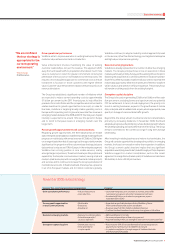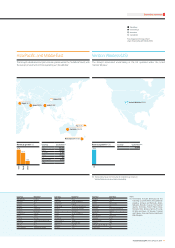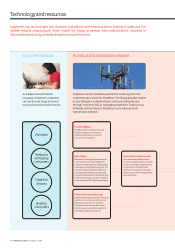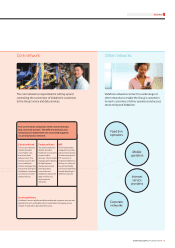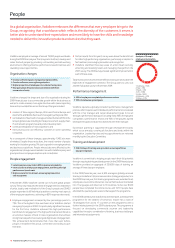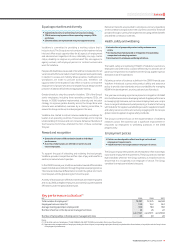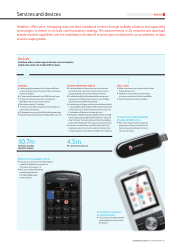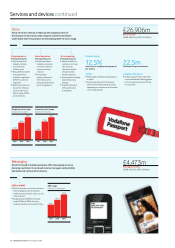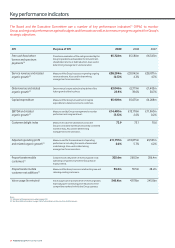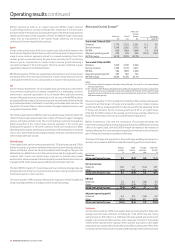Vodafone 2009 Annual Report Download - page 21
Download and view the complete annual report
Please find page 21 of the 2009 Vodafone annual report below. You can navigate through the pages in the report by either clicking on the pages listed below, or by using the keyword search tool below to find specific information within the annual report.
Vodafone Group Plc Annual Report 2009 19
Business
Equal opportunities and diversity
Implementation of a new diversity and inclusion strategy.•
13% of senior employees and three operating company CEOs •
are female.
23 nationalities are represented in top management bands.•
Vodafone is committed to providing a working culture that is
inclusive to all. The Group does not condone unfair treatment of any
kind and offers equal opportunities for all aspects of employment
and advancement regardless of race, nationality, sex, age, marital
status, disability or religious or political belief. This also applies to
agency workers, self employed persons or contract workers who
work for Vodafone.
People with disabilities are assured of full and fair consideration for all
vacancies and efforts are made to meet their special needs, particularly
in relation to access and mobility. Where possible, modifications to
workplaces are made to provide access and, therefore, job
opportunities for the disabled. Every effort is made to continue the
employment of people who become disabled via job design and the
provision of additional facilities and appropriate training.
Gender diversity is a key focus area for Vodafone. 13% of the Group’s
senior employees, including three operating company CEOs, are
female. In 2008, Vodafone implemented a diversity and inclusion
strategy to improve gender diversity across the Group. Nine work
streams were established, overseen by a steering committee, to
ensure the Group continues to make progress in this area.
Vodafone has started to rollout inclusive leadership workshops for
leaders in all operating countries. These workshops aim to improve
understanding of inclusive and non-inclusive behaviour. Members of
the Executive Committee attended the first of these workshops
this year.
Reward and recognition
Extension of reward differentiation based on individual •
performance.
A variety of share plans are offered to incentivise and •
retain employees.
To support the goal of attracting and retaining the best people,
Vodafone provides competitive and fair rates of pay and benefits in
each local market where it operates.
In the 2009 financial year, Vodafone extended reward differentiation
based on individual contribution through the global reward programmes.
This included individual differentiation on both the global short term
incentive plan and the global long term incentive plan.
A variety of share plans are offered to incentivise and retain employees
and in July 2008, all eligible employees across the Group were granted
290 shares under the global allshare plan.
Retirement benefits are provided to employees and vary depending
on the conditions and practices in the countries concerned. These are
provided through a variety of arrangements including defined benefit
and defined contribution schemes.
Health, safety and wellbeing
Introduction of group wide product safety and assurance •
policy.
Increasing importance placed on integration into operating •
companies in developing markets.
Improvement in employee wellbeing initiatives.•
The health, safety and wellbeing (‘HS&W’) of Vodafone’s customers,
employees and others who could be affected by its activities are of
paramount importance to Vodafone and the Group applies rigorous
standards to all of its operations.
Following a review of business activities in the 2009 financial year,
Vodafone introduced a group wide product safety and assurance
policy to provide clear standards and accountabilities for managing
HS&W in the development, sourcing, sale and use of products.
This year saw increasing importance placed on integration of HS&W
into Vodafone businesses in developing markets. Supplier performance
in managing high risk areas, such as network deployment, was a major
focus. A range of initiatives included producing a ‘ Guide to Partnering
with Vodafone’ for suppliers, establishing access for suppliers to health
and safety resources online and actively engaging with the Group’s
global network suppliers to agree safety standards.
The Group’s continued focus on the implementation of wellbeing
initiatives across the business saw a significant improvement in
responses by employees to wellbeing questions in the 2008
people survey.
Employment policies
Policies are developed to reflect local legal, cultural and •
employment requirements.
Vodafone aims to be recognised as an employer of choice.•
The Group’s employment policies are developed to reflect local legal,
cultural and employment requirements. The Group seeks to maintain
high standards wherever the Group operates, as Vodafone aims to
ensure that it is recognised as an employer of choice. The Group
considers its employee relations to be good.
Key performance indicators(1)
KPI 2009 2008 2007
Total number of employees(2) 79,097 72,375 66,343
Employee turnover rates (%) 13.0 15.2 14.2
Average training spend per employee (£) 600 704 530
Number of women in the top senior management roles 29 26 22
out of 221 out of 211 out of 204
Number of nationalities in the top senior management roles 23 20 20
Notes:
(1) Of the total number of employees, 71,664 (2008: 62,456, 2007: 59,909) are included in the scope of these figures.
(2) Represents the average number of employees during the financial year, incorporating employees of newly acquired entities from the date of acquisition and the Group’s share
of employees in joint ventures.


